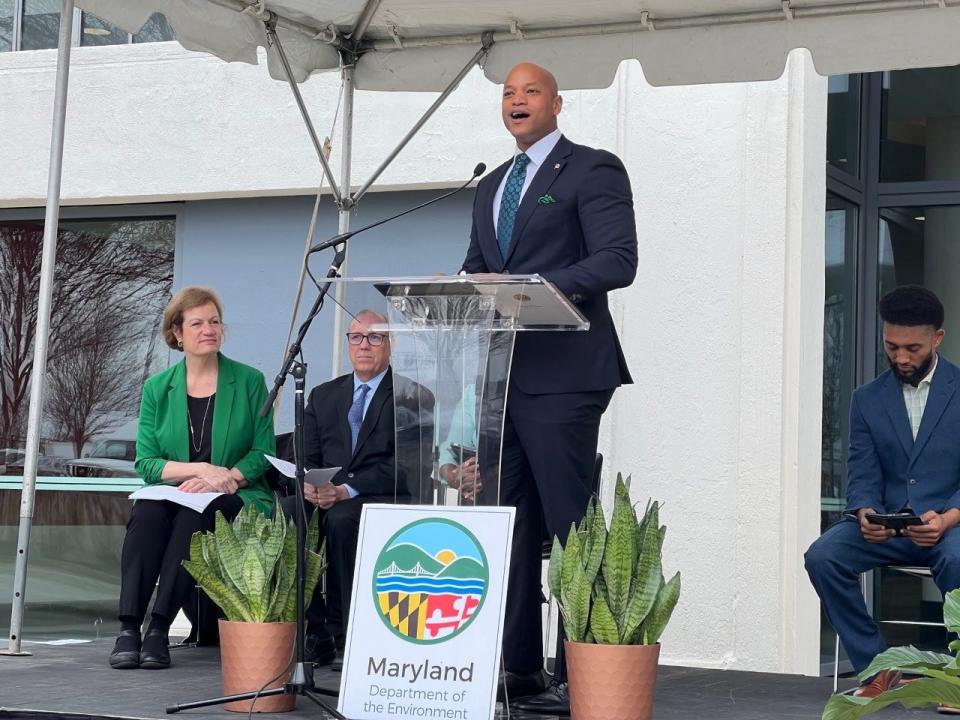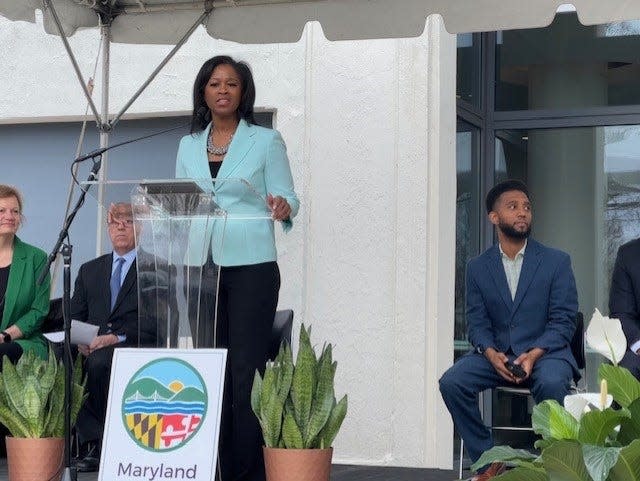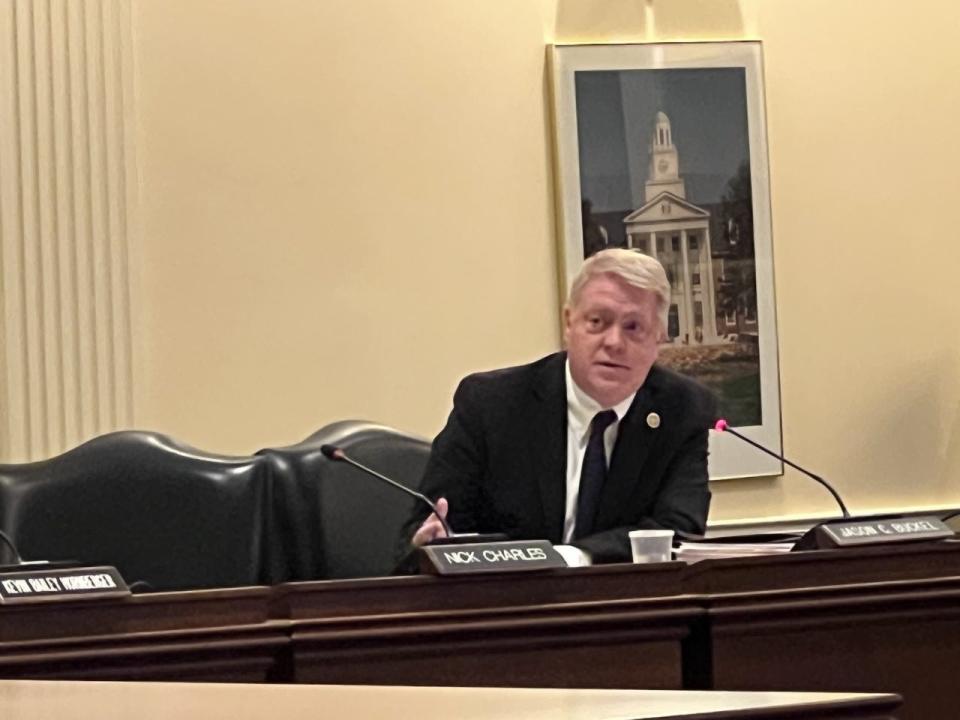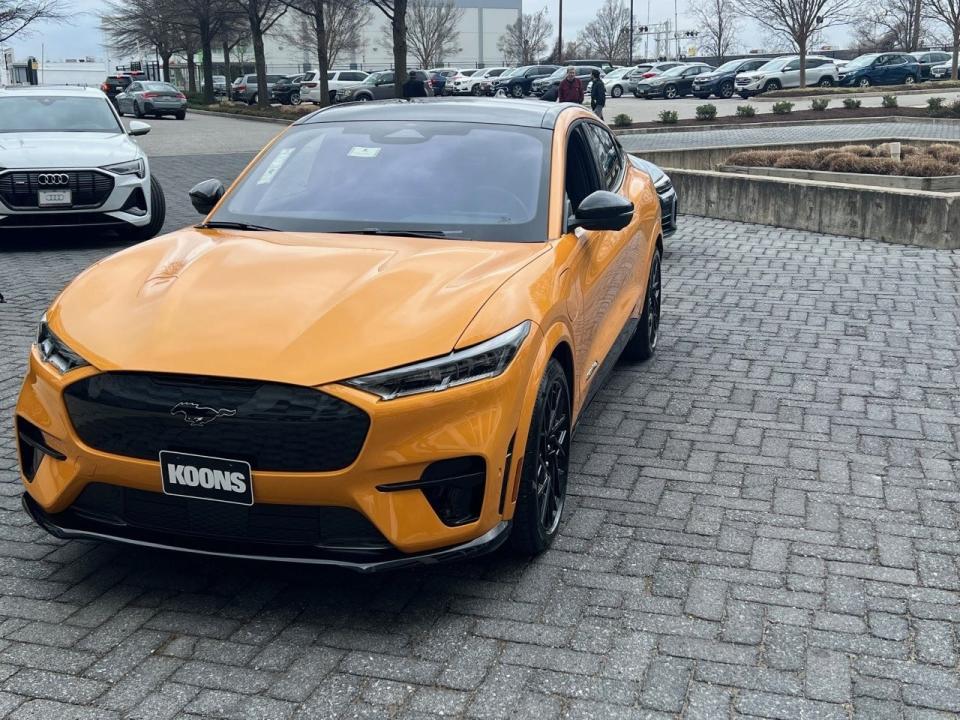As Moore administration races ahead with clean cars, state far behind goal
Gov. Wes Moore signaled his administration’s commitment to clean cars, announcing a phase out of the sale of new gas-powered vehicles by 2035 during an event in Baltimore on Monday afternoon.
The governor’s announcement brings the state in line with California, which last year announced a goal of banning the sale of gas-powered vehicles by 2035. Maryland faces an uphill road in electric vehicle adoption, with the ownership rate currently hovering around 1 percent of total vehicles and the state far from its own goal of 300,000 registered electric vehicles by 2025.
“We need to make sure that this clean car revolution leaves no one behind,” said Moore, standing in front of what was once the Montgomery Ward department store building and has transitioned to house several businesses and agencies, including the state’s Department of Environment.

The eight-plus story structure, once patronized by the city’s now-mayor before going vacant, symbolized what the state’s chief executive aims to do with cars and their power sources.
“This building tells the story of something that needed reimagining and brings it into the future,” he said. “That’s the kind of transformation that we want to bring.”
Maryland following California's policy on clean cars
Driving the change is the Climate Solutions Now Act passed last year, which sets a goal to reduce greenhouse gas emissions by 60 percent by 2031 from 2006 levels. Maryland met its 2020 target in reducing greenhouse gases, but with a steeper target ahead, Department of Environment Secretary Serena McIlwain called the administration’s action a “first step” towards meeting the 2031 goal.
The governor said the department is “on track to finalize the rule this fall.” The proposed Advanced Clean Cars II regulation requires manufacturers to increase the share of vehicles they sell that are electric, starting with a 43 percent rate in model year 2027 and finishing with a 100 percent rate in model year 2035.

McIlwain, most recently the undersecretary of California’s Environmental Protection Agency and questioned during her confirmation hearing about whether that state’s ban on gas-powered road vehicles was achievable, did not misrepresent the origin of regulation on Monday.
“It’s the same Advanced Clean Cars II program (as California),” said McIlwain, in an interview after the announcement. “It’s the exact same program. We’re just adopting it here in Maryland.”
State House Republican leaders disagree
A 2007 Maryland law led the state to follow California’s vehicle emission standards. Some State House Republicans were not pleased with the Moore administration continuing to follow the policy of the Golden State, which has a nation-sized economy and more than twice the rate of electric vehicle adoption as Maryland.
“This is a policy that was created in California,” said House Minority Leader Del. Jason Buckel, R-Allegany, in a release, calling the policy adoption for Maryland both “counter-productive” and “irresponsible.”

House Minority Whip Del. Jesse Pippy, R-Frederick, said in the release that the administration’s announcement “completely ignored” the practical realities of the policy, citing the high cost of electric vehicles.
The average cost of a new electric vehicle is over $65,000, according to estimates from last year from Kelley Blue Book. The state’s electric vehicle tax credit of up to $3,000 is not available again until July 1. A federal electric vehicle tax credit of up to $7,500 applies to vehicles that undergo their final assembly in North America and meet specifications for weight and battery.
Moore pushes ahead as state still far short of 2025 goal
A month before Moore took office, the state’s Department of Transportation reaffirmed its goal to have 300,000 registered electric vehicles in Maryland by 2025. Moore did not step away from that figure when asked about it on Monday after getting out of the driver seat of an orange Mustang electric vehicle that he test drove in the parking lot of the old Montgomery Ward store.

“The thing that we’re seeing now is that with the level of investment that’s being made, and frankly the partnership that we’re pulling together, we know that we can actually advance these goals and objectives,” he said. As of late last year, Maryland had 60,294 registered electric vehicles, about 240,000 away from the state’s 2025 target.
During the announcement, Moore indicated that the regulation could cut vehicle emissions in the state by 75 percent over the next two decades. Maryland League of Conservation Voters Executive Director Kim Coble, who also spoke at the announcement, called the transportation sector the “largest contributor to greenhouse gas emissions in Maryland” in a news release.
27 percent of the nation’s greenhouse gas emissions came from the transportation sector in 2020, according to the United States Environmental Protection Agency, making it the highest contributor of any sector that year.
In his speech, Moore referenced the many environmental actions that are already underway in the state, including the electric vehicle tax credit program, the building out of charging stations (with federal dollars), and legislation he proposed currently being considered by the state Legislature in Annapolis called the Clean Transportation and Energy Act.
“It won’t be enough to just move forward with this regulation and then to simply call that alone a ‘victory,’” he said.
Dwight A. Weingarten is an investigative reporter, covering the Maryland State House and state issues. He can be reached at dweingarten@gannett.com or on Twitter at @DwightWeingart2.
MARYLAND SCHOOLS: How transparent are Maryland school systems' websites? An investigative dive in
LEGALIZED POT: Recreational marijuana sold in Maryland stores? It's on way with House passing framework
This article originally appeared on The Herald-Mail: As Moore races ahead with clean cars, Maryland far behind own goal

